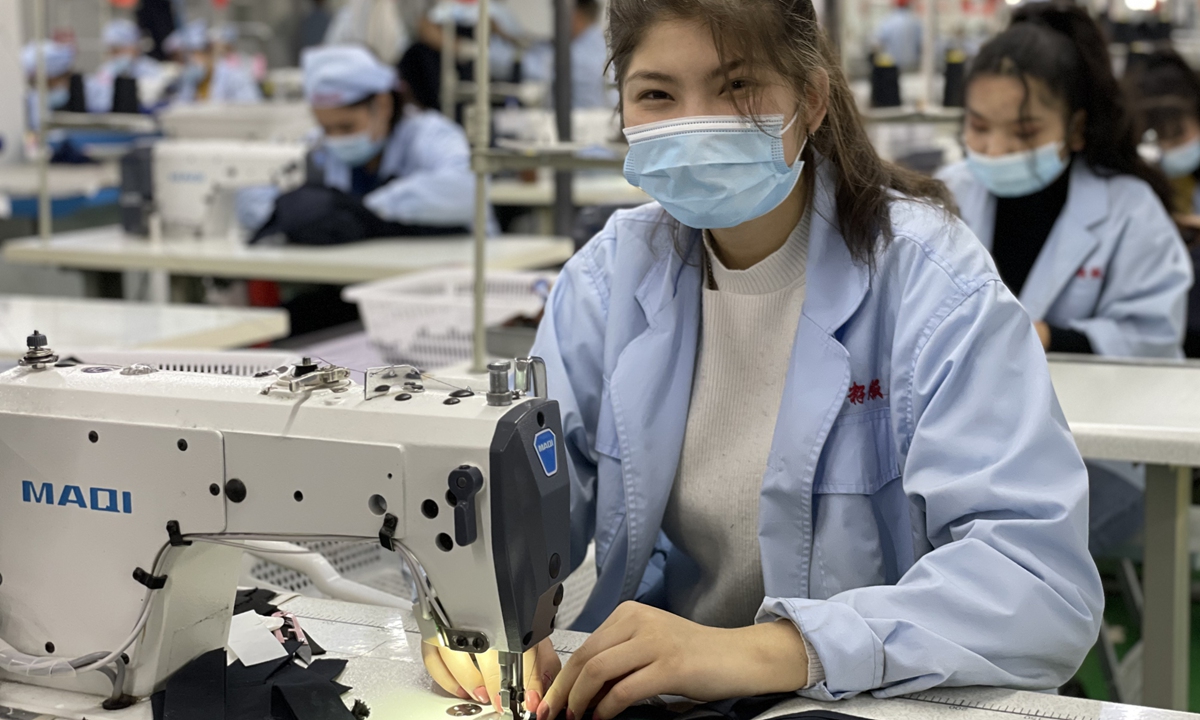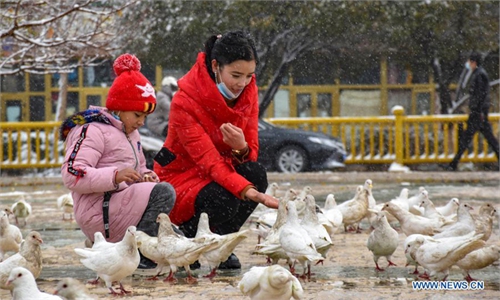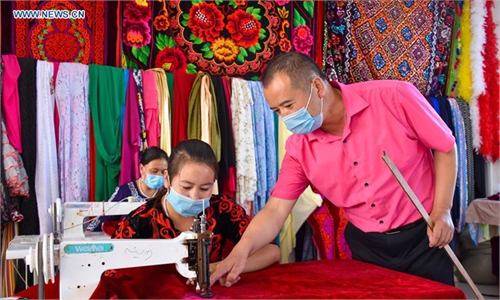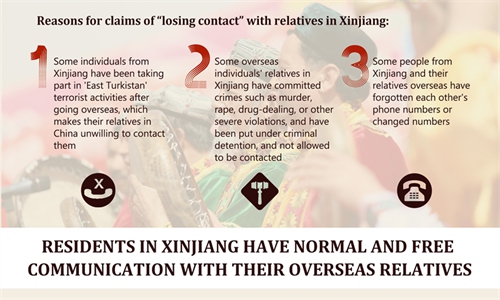UK ‘ban’ on China imports based on untenable accusations by anti-China think tanks, Xinjiang separatists

A worker in the Pomegranate Seed Garment Co. in Northwest China's Xinjiang Uygur Autonomous Region agrees to have her photo taken. Photo: Fan Lingzhi/GT
The UK is reportedly set to tighten laws on imports related to China’s Xinjiang Uygur Autonomous Region for so-called forced labor accusations, an impetuous move that has been made based on untenable “evidence” which will worsen the frosty China-UK ties, analysts said.
UK Foreign Secretary Dominic Raab was reportedly to make a statement on Tuesday in the House of Commons on the UK government’s response to allegations of “forced labor” in China’s Xinjiang region, The Telegraph reported on Monday.
The report noted that the measures expected to be unveiled by the government include expansion of the Modern Slavery Act, reacting to concerns that “items manufactured under duress” by Uygurs may be entering the UK.
The measures are due to be announced by Raab and the trade secretary, Liz Truss, in the Commons on Wednesday. As many as five officials were being considered for sanctions for “human rights abuses,” The Guardian reported.
Despite claims that two Commons committees had been investigating the issue of forced labor previously, the so-called investigations or hearings held on the issues were far from fair or just, with a bunch of anti-China think tanks and separatists from Xinjiang attending and making biased conclusions before any investigations are held.
For example, the Business, Energy and Industrial Strategy Committee (BEIS), a select of House of Commons held a hearing on November 5 over “forced labor in the UK value chains.”
The Global Times has learned that this hearing was held after the Arise Foundation and Quilliam International applied and submitted “evidence.” The BEIS also asked 29 “related” companies to attend the hearing.
Representatives from “Lawyers for Uyghur Rights” and “the Coalition to End Forced Labor in the Uyghur Region” – two institutions that have long been involved in spreading disinformation about China’s Xinjiang policies – submitted “written evidence.”
The files for the hearings also revealed it was not about checking whether there is “forced labor” in China’s Xinjiang, but about seeking “evidence” from “witnesses” to support their pre-set conclusions.
For example, when asking Liz Kanter, director of the government relations and public policy at TikTok in the UK, British Member of Parliament Nusrat Ghani began by saying that she has “been doing some work with the Jewish News” which had two front pages that reflect 2 million people in Xinjiang were in “camps” and their “labor [is] being exploited.” Without even checking whether her claim was true, the UK politician asked Kanter did TikTok realize that its parent company ByteDance was “implicated in providing surveillance equipment to manage these camps in Xinjiang.”
Kanter from TikTok replied that she had talked to colleagues who run the Douyin app in China and she can “unequivocally deny the allegations that have been made against the company” since they are “incorrect and false.”
Kanter also stressed that TikTok does not operate in China and the app called Douyin that services the Chinese market supports poverty alleviation efforts in many regions across China, including the Xinjiang region, to help farmers promote their products.
However, Ghani seemed to pay no attention to Kanter’s replies and kept raising questions based on false accusations, for example, that “children are removed from their parents in Xinjiang” or the Chinese government “oppresses the Uygur people.”
Chinese analysts criticized these so-called hearings and investigations, which were held under the excuse of “human rights,” for being based on disinformation and groundless lies about China’s Xinjiang policies, which also reveal the ideological bias of UK politicians.
UK’s accusations against China are untenable and have loopholes in terms of laws. It would also blow a strike on China-UK diplomatic ties, Zhao Chen, a research fellow from the Institute of European Studies of Chinese Academy of Social Sciences, told the Global Times.
Zhao noted that “UK politicians’ recent hostile remarks on China’s Xinjiang and Hong Kong regions have already led to frosty ties as China-UK ties have faded away from the ‘golden era’ after former UK prime minister David Cameron and entered into a turbulent period.”
It also showed some British elites’ refusal to give up the British Empire’s “legacy” and their wish to use human rights as an excuse to criticize other countries and interfere with their domestic affairs, Zhao said, noting that British elites should know that their country would be further marginalized if they do not cast aside ideological bias when viewing other countries.
Global Times




